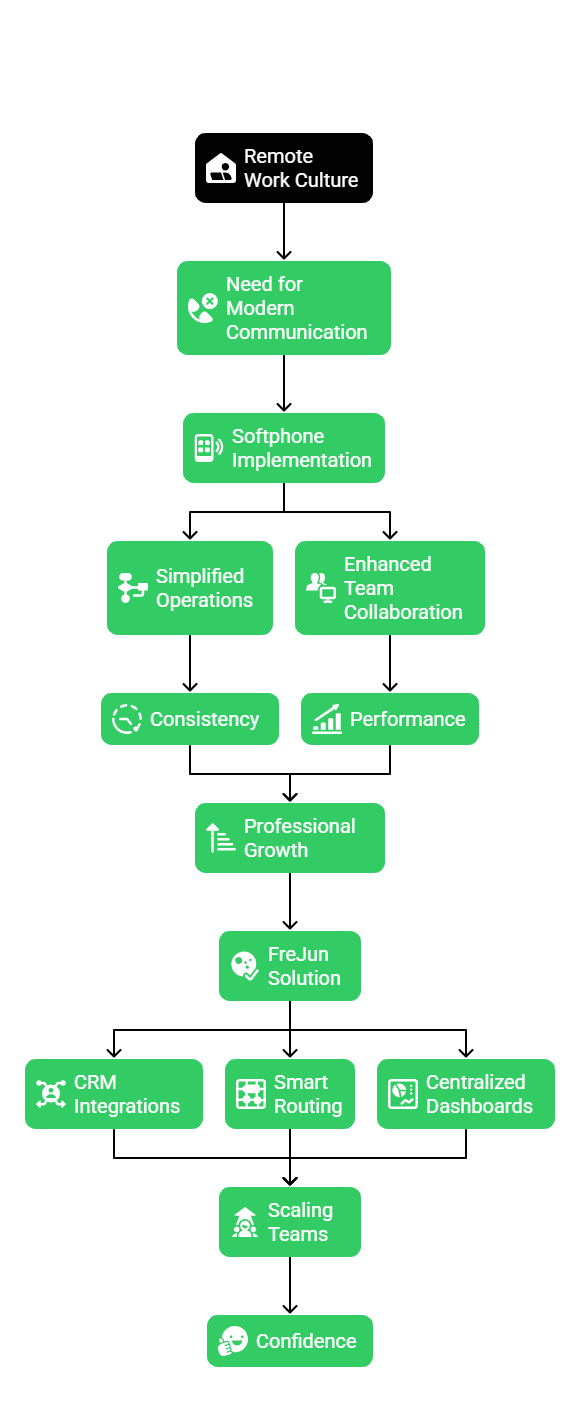How can remote teams in South Korea stay connected, productive, and professionally engaged in an increasingly digital and distributed work environment? With the acceleration of hybrid and fully remote work models, South Korean enterprises are rapidly rethinking how they enable internal communication, client interactions, and team collaboration. Traditional desk phones and on-premise communication systems are no longer sufficient to meet the demands of a flexible workforce. In this transformative phase, Softphone Implementation stands out as a smart and scalable solution, offering organizations the agility to communicate effectively across devices and geographies while also complying with global communication standards like GDPR.
Softphone Implementation refers to the deployment of software-based calling tools that operate via the internet and are accessible through devices like laptops, smartphones, and desktops. These solutions allow employees to make high-quality voice and video calls, join virtual meetings, share screens, send instant messages, and even integrate with tools like CRMs and project management platforms, all from a single interface. For businesses in South Korea navigating the complexities of a global economy, softphones deliver a competitive edge by eliminating hardware costs, supporting mobility, and enabling seamless team collaboration across time zones.
Table of contents
- What is Softphone Implementation and Why Does It Matter Today?
- How Does FreJun Support Remote Teams with Softphones?
- Top Benefits of Softphone Implementation for Professional Growth
- Steps to Successful Softphone Implementation in Remote Teams
- Comparison Table: Softphones vs Traditional VoIP Tools
- Key Takeaways
- Final Thoughts
- FAQs
What is Softphone Implementation and Why Does It Matter Today?
Softphone Implementation refers to setting up cloud-based calling systems that empower your team to make and receive calls directly from their laptops, tablets, or smartphones, without the need for traditional desk phones or bulky telecom hardware. This digital approach to communication is redefining workplace connectivity by eliminating physical limitations and delivering communication through internet-powered platforms. For businesses aiming to remain competitive in a fast-paced, global economy, especially in South Korea’s dynamic corporate landscape, this shift is not just a convenience; it’s a strategic necessity. Softphones streamline workflows, reduce operational costs, and make it possible for remote and hybrid teams to stay connected with clarity and consistency.

In a country like South Korea, where innovation, speed, and adaptability are driving business success, adopting FreJun’s Softphone solution represents a forward-thinking step toward digital transformation. FreJun ensures high-definition voice quality on every call, real-time data synchronization across devices, and flexible call routing that adapts to the needs of both in-office and remote employees. Moreover, companies can skip the hassle of complex installations. FreJun offers fast deployment with no physical infrastructure required. The experience is enhanced further by intelligent features such as FreJun’s interactive Dashboard, Call Notes, and Auto-Logging, which help teams document, track, and optimize every conversation.
How Does FreJun Support Remote Teams with Softphones?
FreJun enables teams to run professional-grade communication systems without physical PBX setups. Here’s how:

- Click-to-Call from CRMs – Agents can start calls instantly from their CRM or web apps, reducing context switching and improving efficiency.
- Call Recording with searchable logs – Every call is automatically recorded and stored, making it easy to review conversations, resolve issues, or train new team members.
- Auto-Sync with popular tools – FreJun integrates with platforms like HubSpot, Zoho, and Salesforce, keeping contact records and call activity updated in real time.
- Admin Control Panel for managers – Supervisors can monitor call activity, manage teams, and adjust settings without disrupting workflows.
- Frictionless remote collaboration – The system is built to support distributed teams, ensuring communication stays organized, accessible, and responsive across time zones.
- Professional experience for all users – Whether you’re an agent handling daily calls or a manager overseeing operations, FreJun offers a clean, intuitive interface that simplifies remote work.
- Reliable Softphone Implementation – FreJun empowers remote teams to operate as efficiently and professionally as in-office teams, supporting long-term growth and stability.
These tools help managers track KPIs while agents enjoy a smooth and modern calling experience.
Top Benefits of Softphone Implementation for Professional Growth
Adopting Softphone Implementation is not just about modernizing your tools; it’s about enabling teams to grow faster, work smarter, and deliver better results.

1. Faster onboarding
With a simple and intuitive setup, new team members can start making calls immediately. There’s no waiting for hardware, desk setups, or IT support; just log in and go.
2. Flexible scalability
Whether your team is expanding rapidly or adjusting to shifting demands, adding or removing users is quick and hassle-free. This flexibility makes it easier to adapt as your business evolves.
3. Better knowledge retention
With every call recorded and stored, teams can revisit important conversations, train new employees with real examples, and ensure consistency in how customer interactions are handled.
4. Data-driven improvements
Managers can easily track performance across individuals or teams. By analyzing call logs, patterns, and outcomes, they can identify areas to improve and take action with confidence.
5. Stronger client relationships
High-quality, consistent communication builds trust with customers. A reliable calling experience reflects professionalism and reinforces your brand in every conversation.
With features like Local Number Support and Smart Call Routing, FreJun ensures that remote teams maintain a strong, professional presence no matter where they’re located. It’s a system built for connection, clarity, and long-term success.
Steps to Successful Softphone Implementation in Remote Teams
A smooth and effective Softphone Implementation relies on more than just choosing the right software; it’s about thoughtful planning, clear communication, and strategic execution. Here’s how to get it right:

1. Assess needs
Start by understanding your team’s current setup and communication challenges. Consider factors like team size, locations, work styles, and the tools already in use. Identify gaps: Is there poor call quality, a lack of integration, or difficulty scaling? A clear assessment will shape your requirements and help avoid unnecessary features or overlooked needs.
2. Choose the right platform
Look for a platform that fits your team’s workflow. Must-haves include CRM integration, analytics, and multi-device access. Prioritize ease of use, security, and long-term support. The goal is to select a tool that complements your existing systems and enhances the way your team communicates, without introducing complexity.
3. Rollout gradually
Instead of switching everyone at once, start with a small pilot group. This allows you to test real-world usage, gather feedback, and resolve issues early. A phased rollout reduces disruptions and helps you build internal champions who can support others during full implementation.
4. Train your team
Even the best tool falls flat without proper training. Offer simple onboarding resources like video walkthroughs, live sessions, or documentation. Make sure users understand not just how to use the tool, but how it benefits their day-to-day tasks. Empowering your team early increases adoption and reduces resistance.
5. Monitor and optimize
Once your system is live, don’t set it and forget it. Use call analytics, user feedback, and support requests to identify areas for improvement. Monitor adoption rates, call quality, and integration success. Adjust workflows, add helpful automations, and continuously fine-tune based on real usage data.
A successful Softphone Implementation is equal parts technology and process. With the right strategy, remote teams can adopt powerful communication tools with confidence.
Comparison Table: Softphones vs Traditional VoIP Tools

As businesses in South Korea and around the world shift toward flexible and remote-first work models, communication tools have taken center stage in driving productivity and collaboration. Two prominent options in this space are softphones and traditional VoIP tools. While both enable voice communication over the internet, they differ significantly in how they are implemented, accessed, and integrated into daily workflows. For companies pursuing bold digital transformation strategies, embracing Softphone Implementation is proving to be a more scalable and intelligent solution.
Softphone Implementation offers a more agile and modern approach to internet-based calling. Unlike traditional VoIP tools that often rely on dedicated desk phones or require partial hardware setup, softphones are fully software-based and accessible from any internet-connected device. They typically come with enhanced features like mobile compatibility, seamless CRM integration, auto-logging, and advanced analytics dashboards. On the other hand, traditional VoIP systems may provide basic internet calling but can fall short in areas like mobility, scalability, and user experience. Below is a comparison table that highlights the key distinctions between softphones and traditional VoIP tools.
Key Takeaways
Softphone Implementation equips remote teams with the structure and flexibility needed to perform at their best. It removes the barriers of traditional phone systems, enabling faster communication, easier collaboration, and a more professional presence across the board. With FreJun, the entire process becomes smoother from setup to daily use, thanks to features like CRM integration, call recording, and centralized control. Instead of juggling multiple tools or relying on patchy setups, teams can work confidently within one unified system that’s built for remote success.

If you’re considering making the switch, don’t wait. Early Softphone Implementation can help your team adapt faster, align more easily, and stay competitive in a remote-first world. It creates a strong foundation for growth by streamlining how your team connects with clients, tracks progress, and scales operations. FreJun gives you the tools to lead, not lag, and that’s a clear advantage in today’s fast-moving work environments.
Final Thoughts
South Korea’s remote work culture is no longer just a trend; it’s the new normal. As teams grow more distributed and digital-first operations become the default, businesses must rethink how their people communicate, collaborate, and connect. Relying on outdated phone systems or fragmented tools only creates friction in workflows, in client interactions, and across internal teams. That’s where Softphone Implementation makes a meaningful difference. It removes the dependency on physical infrastructure, simplifies day-to-day operations, and gives teams a modern communication backbone they can trust, no matter where they work from. It’s not just about enabling calls, it’s about enabling momentum.
When implemented effectively, a softphone solution becomes more than just a piece of software. It becomes the foundation for consistency, performance, and professional growth across the organization. With FreJun, teams don’t have to compromise between flexibility and structure. Every call is logged, every interaction is accessible, and every manager has visibility into how communication impacts performance. Features like CRM integrations, smart routing, and centralized dashboards aren’t just conveniences; they’re critical components for scaling teams with confidence. By choosing FreJun, companies in South Korea equip themselves with a solution built for today’s challenges and tomorrow’s growth.

Further Reading – US VoIP Number Implementation for International Trade in Saudi Arabia
FAQs
Softphones work on laptops, desktops, and mobile devices, giving teams the flexibility to stay connected from anywhere. FreJun supports all major operating systems, ensuring a smooth experience across platforms.
Not at all. With FreJun, the setup process is designed to be intuitive and fast. Most teams can get up and running without any technical background, thanks to guided onboarding and built-in configuration support.
Yes. FreJun automatically records all calls and stores them in a centralized, searchable log. This helps with training, compliance, and quality control — especially in remote team environments.
A stable internet connection is important for maintaining call clarity. However, FreJun is optimized to deliver high-quality audio even on moderate bandwidths, making it reliable across varied network conditions.
Absolutely. FreJun integrates with popular CRMs like Salesforce, Zoho, and HubSpot, enabling teams to sync call data, streamline lead management, and reduce manual entry. This creates a more unified and efficient communication system.
